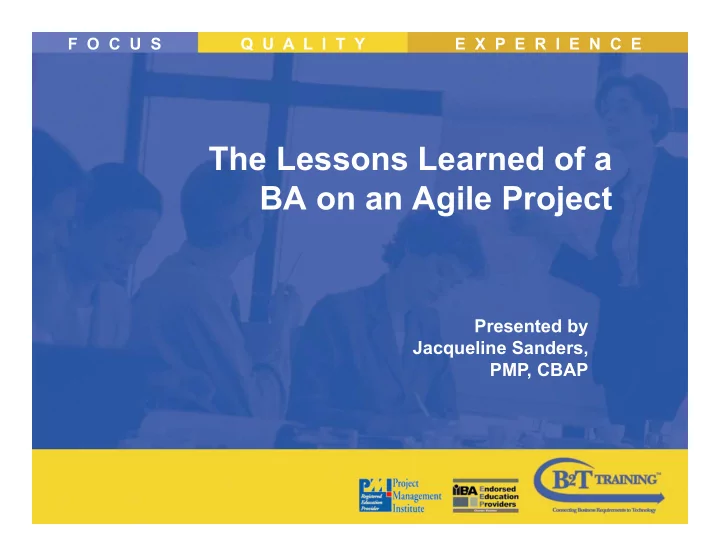

F O C U S Q U A L I T Y E X P E R I E N C E The Lessons Learned of a BA on an Agile Project Presented by Jacqueline Sanders, PMP, CBAP
Outline What Agile is NOT Key Components of Agile The Conversion to Agile The New Development Project using Agile The Maintenance Releases using Agile The Future of BA’s on Agile Projects
What Agile is NOT Big “A”: Formal Agile – a disciplined methodology (i.e. stand up meetings, co-located, iterations) Little “a”: Informal agile – teams just trying to do things quickly, haphazard and chaotic
Agile Manifesto Agile Values: Over Individuals and interactions Process and tools Over Working Software Comprehensive documentation Over Customer Collaboration Contract negotiation Responding to change Over Following a plan
Key Components of Agile Short Iterations Design/Build/Test as you go Small Dedicated Project Teams Highly Functioning and Self-managed Team Co-located Teams Task Board and Burn Pairings down Chart Assigned SME Retrospectives Weekly Sprints Daily Standup Meetings
Converting to Agile Brought in Agile Coaches Gave Exit Packages to Non-Agile Resources Brought in New Agile-minded Resources Sent the Team to Agile Boot Camp Co-Located the Team Conducted Team Building Exercises Created a Fun Environment Made “Most” Resources 100% Dedicated
New Development Project using Agile Semi- Weekly Iteration 0 Deploy Scoping of & The Project Retrospectives Initial Weekly Backlog Stakeholder Decomposition Demos Sprint Daily Scrum Semi Weekly Team Sprint Planning Meetings Meetings
The Project Parameters Government Regulation Hard Deadline Existing Application New Data Fields Significant Changes to Business Rules & Process Impact to 12 Different Departments Impact to Entire Customer Base Coincided with Media & Marketing Campaigns Two Executive Sponsors The #1 Priority for the 4th Quarter
The BA’s Project Initiation Tasks Iteration (0) Zero Sponsor Consensus on Approach Assist with High Level Technical Design Interviews and Facilitated Sessions 1 or more Iterations Ahead of Development Wiki Set Up Artifacts: • User List • User Stories
The User Story List
User Stories
The BA’s On-going Activities Daily Stand Up & Follow Up Spontaneous and As Needed • Meetings with Stakeholders • Monitor Development Work • Respond to QA Multi-Tasking • Working The Open Issues • UAT Preparation • Weekly Demo Prep • Research User Stories for Next Iterations • Maintain Project Wiki
The Backlog Story/Task Board
User Story Cards
Behind The Scenes Activities Manage Multiple Viewpoints Modeling and Diagrams during Design Discussions SME Intimidated by Developers Backend Process Requirements Rework was Necessary Document Needed During Implementation Compensated for Lack of BA Skills Focus on Exceptions and Alternatives Issue Log (In Scope and Out of Scope Negotiation)
New Development – Retrospect What Worked Well Access to Software Designers/Architect Iteration Zero Having Agile Coaches Incorporating Lessons Learned Quickly Sponsor Accepted Risk
New Development – Retrospect What We Could Do Differently Underestimating the Rework Underestimating Backend Processes Managing Unrealistic, Hard Deadlines Addressing People not embracing Agile Handling Process Development Differently Upfront Database schema changes
Maintenance Projects using Agile Semi- Weekly Iteration 0 Deploy Not & Applicable Retrospectives Initial Weekly Backlog Stakeholder Sprint Demos Not Applicable Daily Scrum Semi Weekly Team Sprint Planning Meetings Meetings
The Maintenance Project Parameters Developer Initiative 2 Week Iterations As Needed Requirements or Just In Time Not Co-located Semi-Weekly Demos Semi-Weekly Planning Sessions Business was not Agile PM tolerated Agile but was not Agile No executive sponsor for Agile
The BA’s Activities 2 Week Iterations As-Needed / Just-In-Time Requirements Semi-Weekly Demos Semi-Weekly Planning Sessions Provided Documentation to the Business Facilitated Demos Unofficially attended stand ups Unofficially attended sprints
Maintenance Project - Retrospect What Worked Well: Developers Fully Engaged User Involvement Early and Often Cohesive Team
Maintenance Project - Retrospect What Could Have Been Done Different: Executive Sponsor Buy In Realistic Dates Appreciations of Burn down and Velocity Dysfunctional Organization Developers Input Respected
Conclusion
Recommend
More recommend